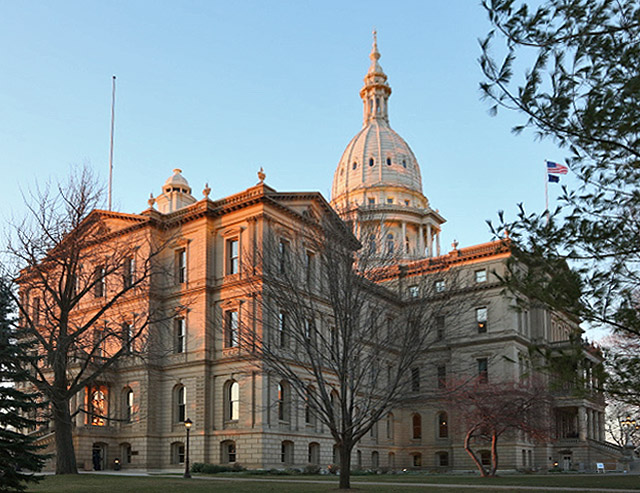Today’s guest post is by Laura Packard, a partner at PowerThru Consulting, a growing national progressive digital consulting shop.
Enjoy.
With both the GOP and Democratic presidential candidates coming to Michigan this week for their respective debates, I hope some of the larger issues that Michigan (and the country) faces will finally be addressed.
Michigan state government has been broken for decades, but it’s just now coming to people’s attention outside our state. How did this happen? And could it happen to you?
The Michigan legislature used to be populated (at least somewhat) by dedicated public servants on both parties. Being a legislator used to be a career, and like most careers people get better at it over time.
But there is also the very real problem of people staying in power too long, and not being answerable to the people or in touch with their constituents. How much does any voter really know about their legislators? State legislators and Congresspeople get re-elected time after time, because people have no accurate and independent way of judging whether they’re doing a good job or not.
 To answer that problem, the people of Michigan passed a constitutional amendment in 1992, limiting Governors (and other executive branch elected officials) and State Senators to two 4-year terms, and State Representatives to three 2-year terms.
To answer that problem, the people of Michigan passed a constitutional amendment in 1992, limiting Governors (and other executive branch elected officials) and State Senators to two 4-year terms, and State Representatives to three 2-year terms.
Sounds good, right? Except for some unintended consequences.
Because people can no longer make a career of public service, the only people (for the most part) willing to run for office are the young, the old, the independently wealthy or those not able to find any other decent-paying jobs. For those mid-career, often juggling children and caring for aging parents, taking 6 years out of your successful career can mean ending your career. So this means many Michigan state representatives are in their 20s or 30s, and frantically looking for their next job. Which makes them vulnerable to pressures to vote a certain way, so as to be “taken care of” for their next job. House Representatives Daniela Garcia and Lisa Posthumus Lyons are two particularly blatant examples of this.
Also, because there’s no institutional memory, the House (and the Senate to some extent) are run by unelected staffers. As soon as an elected official figures out how things work and learn a thing or two about the issues, they’re out of office.
At least elected officials are answerable to the people, right? Not exactly. Michigan is so gerrymandered that very few House and Senate seats are competitive, so they are answerable more to the donors (and their future employers) than to their constituents. To make absolutely sure of that, our elected officials have been working hard at making it harder to vote in Michigan, from passing voter laws that hurt students many years ago to eliminating straight party voting a couple months ago to increase long lines at urban precincts.
This is how the legislature does not and cannot form a check and balance on the Governor’s office. Individual legislators are more concerned about not rocking the boat and positioning themselves to run for higher office or a lucrative job as a lobbyist. Or they are with the party out of power, and are completely ignored.
So we elected a legislature that doesn’t know how to govern, and added to that a Governor that doesn’t know how to govern (or have any interest in it) either. There are no experienced adults in the room anymore.
What do we do about it? Several things need to be done: change the way we redraw legislative districts to be an independent commission, so voters choose their representatives and not vice versa. Loosen term limits or repeal them entirely, so people can build careers in public service again, rather than it being a way-station to lobbyist gigs or higher office. Make it easier to register to vote and exercise that vote, to make politicians more answerable to the people. And exercise that vote for experienced people who know how to do the job we’re hiring them to do.
Other states such as California have shown that changes for the better can be made in state government, if we’re willing to make them. I’d like to see the Presidential candidates for both parties talk about this.
[Photo credit: Anne C. Savage, special to Eclectablog]



